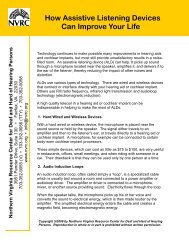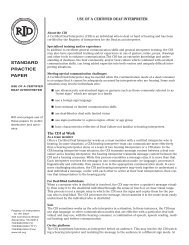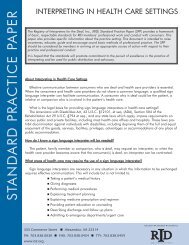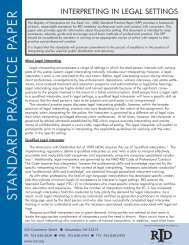Video Remote Interpreting Standard Practice Paper - Registry of ...
Video Remote Interpreting Standard Practice Paper - Registry of ...
Video Remote Interpreting Standard Practice Paper - Registry of ...
Create successful ePaper yourself
Turn your PDF publications into a flip-book with our unique Google optimized e-Paper software.
STANDARD PRACTICE PAPER<br />
Interpreter Qualifications<br />
The legal interpreter should hold the <strong>Registry</strong> <strong>of</strong> Interpreters for the Deaf Specialist Certificate: Legal<br />
(SC:L). In the absence <strong>of</strong> that credential, the interpreter should hold national certification in ASL interpreting<br />
and should have taken legal interpreter training. Deaf interpreters should have both generic<br />
interpreter training and legal interpreter training to be qualified to work in remote interpreting environments.<br />
Preparation/Readiness Protocol<br />
<strong>Interpreting</strong> teams for on-the-record proceedings and attorney-client conferences must preview pertinent<br />
documents from the case file as far in advance as possible. Documents can be sent by facsimile or<br />
by electronic mail to interpreting teams working in a remote setting. Prior to the assignment, the remote<br />
interpreters must be afforded the opportunity to interview each deaf participant and counsel.<br />
The interpreters should supply the hiring party with a copy <strong>of</strong> their credentials by electronic mail or<br />
facsimile to be placed on the record. Prior to interpreting the proceeding, the interpreters should undergo<br />
voir dire, which means to be sworn to interpret accurately and to state credentials and absence <strong>of</strong><br />
any improper relationship with the participants for the record. The oath should include the fact that the<br />
interpretation is being conducted remotely, and that the interpreters agree to stop the proceedings if the<br />
interpretation is compromised by the technology in any manner.<br />
If any party believes that remote interpreting is not effective, then an onsite interpreter must be provided.<br />
With regards to specific technical needs <strong>of</strong> interpreting an on-the-record proceeding remotely, the<br />
equipment must be able to switch between private and public settings in order for the attorney to use<br />
the remote interpreters for attorney-client conversations. During the proceeding, then, if the deaf person<br />
wants to confer with counsel, the proceedings must stop, and either the equipment must be moved to a<br />
private area for the privileged communication, or the attorney must have access to head phones in<br />
order to hear the interpreted rendition <strong>of</strong> the deaf client’s privileged communication. Finally, the technology<br />
must allow for the interpreters to initiate bench conferences when issues affecting the interpretation<br />
need to be heard in private.<br />
In sum, most legal assignments should be handled by onsite interpreting teams. In those limited<br />
instances in which the Federal Rule <strong>of</strong> Criminal Procedure would permit a defendant to attend a proceeding<br />
through videoconferencing technology, then an interpreter who is present through videoconferencing<br />
equipment may also be acceptable. All parties should be afforded the opportunities to accept or<br />
reject video remote interpreting; however, the duty lies within the court interpreter to assess the assignment<br />
and advise the participants regarding the effectiveness <strong>of</strong> the solution.<br />
<strong>Video</strong> <strong>Remote</strong> <strong>Interpreting</strong> - Legal 12






